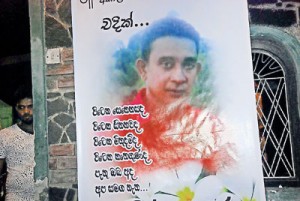News
Suspects in police custody have right to life, stress rights activists

Charitha Chamara: Found dead within five hours of his arrest
The death of a 42- year-old man, last week, while in the custody of the Peliyagoda police emphasises the need to tackle the issue of torture of suspects in the police cell.
Charitha Chamara (42) was found dead within five hours of his arrest. The father of two was arrested around 4 a.m. on February 25 and around 9 a.m. the same day his wife was informed that he was dead.
According to the Judicial Medical Officer’s (JMO) report the man had died of assault injuries. Five police officers including a Sub Inspector were arrested.
In a similar case in Galle, Kariywasam Gamage Priyashantha (39) of Elpitiya who was taken into custody by the Nagoda police on the evening of February 9 died the following morning. The suspect who was arrested around 4 p.m. had been produced in courts the next day and sent to the remand prison in Galle. The suspect had been pronounced dead within an hour of his transfer there.
The post mortem report said the man died of cirrhosis. But the family maintained the body had several injuries consistent with severe assault.
These incidents come in the wake of a recent United Nations report that said torture of suspects under police custody continues, unabated in Sri Lanka.
Human rights activist Dr. Prathiba Mahanamahewa saidthe responsibility of protecting a suspect in custody lies with the Officer-In-Charge of the police station. “It is a right to life,” Mr. Mahanamahewa said.
Dr. Mahanamahewa said while the arrest of five police officers in the Peliyagoda case was a positive step, more had to be done to prevent such occurrences.
He opined that instances of torture in cells should not be investigated by police officers and called for the establishment of a special unit to probe such cases. “Police officers investigating police officers will not help,” he said.
Under the United Nations Convention on the Prevention of Torture, the case of the death of any suspect under police custody has to be indicted in the High Court and prosecuted by the Attorney General.
In 1994, the year that Sri Lanka for the first time implemented the Convention, an estimated 60 cases were filed countrywide within a period of 10 years. Unfortunately the cases were not reported and publicised and did not serve as a precedence or deterrent to police officers, he said.
Dr. Mahanamahewa said lower ranking police officers especially constables, inspectors and OICs have to be made aware that a person in custody has fundamental rights.
He faulted the National Police Commission (NPC) for failing to act on such matters. “It is an independent commission under the 19th Amendment and it must act
Human rights lawyer, K.C.Weliamuna said police as a practice torture suspects in cells to force them to confess. He called on police officials to carryout proper administration and supervision of suspects in custody.

Kariywasam Gamage Priyashantha: Death due to cirrhosis or assault
He stressed the importance of Investigating these cases thoroughly and brining the perpetrators to book.
However, DIG Crimes Prashantha Jayakody said the police do take action.
“In the Peliyagoda case the police officers will face criminal charges and face disciplinary action,” he said.
The DIG Crimes who is also the police spokesman said workshops are being conducted to educate police personnel on zero tolerance of torture in police stations, “We summoned all senior officers including the Superintendent of Police and the Assistant Superintendents of Police and conducted a five day workshop in Colombo,” he said.
In addition protocol related to senior police officers visiting suspects held in custody in police stations is being followed to the letter he said adding that the cells are visited and inspected at night.
However, in some cases like the incident in Pussellawa, where the suspect was found hanging within two hours of being put into the cell nothing can be done, he said. “He was brought in around 3.30 a.m.and around 6.30 a.m. the same day he was found dead. In such cases it is difficult to monitor,” he said.
National Police Commission (NPC) Secretary, Ariyadasa Cooray said the commission is tasked only with a supervisory role and that maintaining law and order and preventing such crimes lie within the purview of the Inspector General of Police (IGP).
He said following the Pussellawa incident the NPC had discussions with the IGP and recommended immediate investigation on deaths of suspects while in police custody.
He said a committee of experts appointed by the Ministry of Law and Order and includes officials from the NPC, the Ministry and the Sri Lanka Police Department were looking at ways to improve the police institution.
“They are studying the system in order to identify areas that need to be addressed and will make recommendations,” he said.

